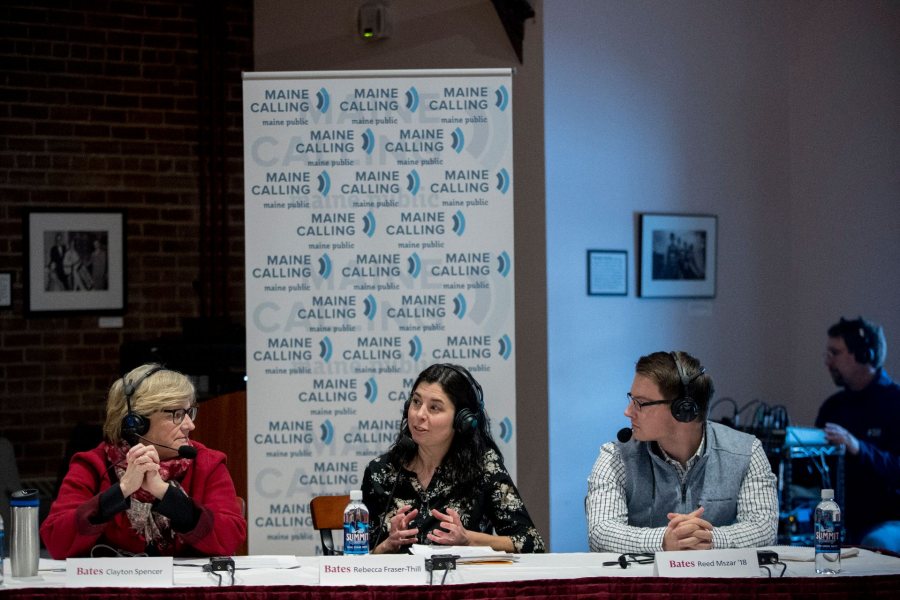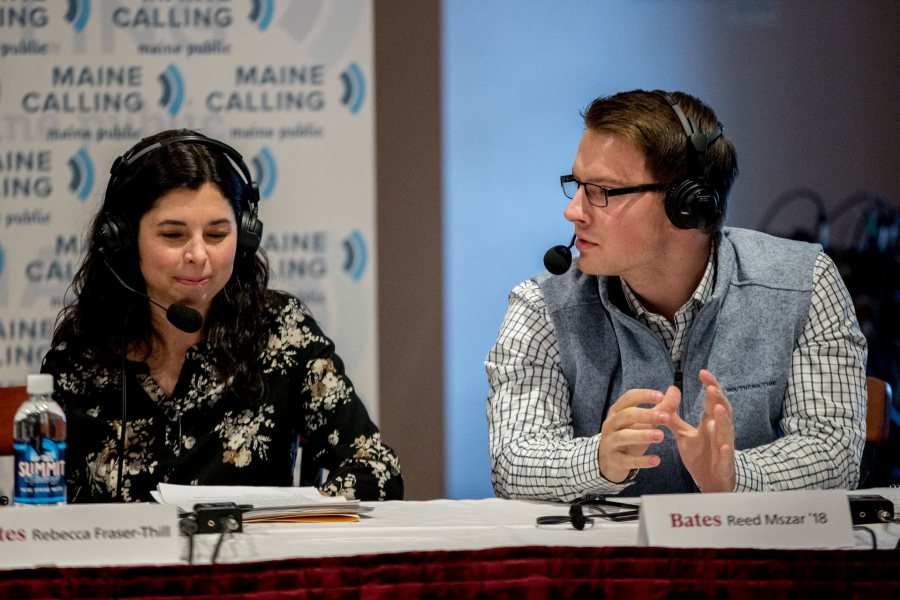
What makes work meaningful? How does fulfillment at work affect other areas of your life? How do you know what’s meaningful for you, and how do you build a career path from that knowledge?
Bates College President Clayton Spencer, Lecturer in Psychology Rebecca Fraser-Thill, and Reed Mszar ’18 discussed those questions — and how Bates’ Purposeful Work program helps students find what gives them purpose — on an episode of Maine Public’s Maine Calling broadcast from Muskie Archives on Jan. 17.
1. There are different types of well-being.
According to a Gallup study, “there are five different types of well-being,” said Fraser-Thill. “There’s physical well-being, which is when we’re feeling like we can do what we need to do, and we’re healthy. There’s the financial piece — I can pay my bills; I’m not stressed about those. The social piece — do I have relationships that I like? The community piece — do I feel like a part of where I live?
“There’s a fifth one, and the fifth one is the key one. There’s what they call purpose well-being or career well-being. That’s where you like what you do every day, and you use your strengths every day.”
2. If you feel you have purpose, everything else falls into place.
“When people have that purpose or career well-being, that predicts all the others,” Fraser-Thill said. “This is true around the world. If we’re liking what we do every day and we’re doing things we’re good at, we’re more likely to be healthy and have great relationships and feel part of our community and have money.”

Rebecca Fraser-Thill, director of faculty engagement and outreach for Purposeful Work, appeared with President Clayton Spencer and Reed Mszar ’18 on Maine Calling on Jan. 17. (Phyllis Graber Jensen/Bates College)
3. Meaningful work is, well, meaningful.
Purposeful Work funds students’ internships and gives them space to reflect on their experiences. That combination of experience and reflection, Spencer said, gets at the core of well-being: “Studies have shown that people care more about finding meaning in their work than they care about pay, than they care about opportunities for promotion, than they care about actual working conditions.”
4. Purpose and self-sufficiency go hand in hand.
“There’s no contradiction between the kind of work you choose to do to support yourself and your family and finding meaning,” Spencer said. “You can be a Wall Street banker, you can be a ballet dancer, you can be a software engineer. All of those kinds of work can be a locus of meaningful work for you.”
5. Employees with purpose make happy employers.
“There are a lot of benefits for employers in terms of individuals who are highly engaged and feeling fulfilled. Productivity goes way up, absenteeism goes way down. When you have an engaged workforce, the physical health — which affects healthcare costs — goes up, because people are feeling well.”
6. Access to education includes access to purposeful work.
“Purposeful Work is about pathways to success for all our students,” Spencer said. “Bates is committed to educational access and opportunity for all students, including students who may not come from parents who have been to college or may not have come from a fancy professional background. We have always recruited them, we have always supported them generously with financial aid, and I want to make sure we’re also supporting them in finding pathways to success after college.”
7. To find purpose, get out into the world.
In addition to its internship program, Purposeful Work includes “infusion courses,” in which students connect course material to the real world, and Purposeful Work Unplugged, a speaker series that brings in Bates alumni to explain their career paths.
Talking to others is key to finding purpose. “For the half of people who want to leave their work, something we’ve learned from working with students and doing the research behind purposeful work is that you have to talk to other individuals,” Fraser-Thill said.
“The networking concept is not just about getting a job; it’s about learning what opportunities are out there, what else might fit with you. You can do that at any point in your life.
“Equally important is to get out of your own head and do something. Volunteer somewhere — sometimes, the volunteerism ends up being such a great meaningful outlet that work starts feeling more tolerable, so you don’t have to leave that job. Design thinking shows us that you have to go out and do the work.”
8. Talking to peers can build purpose.
A Purposeful Work intern, Reed Mszar ’18 worked at Central Maine Medical Center this summer. A valuable piece of the internship, he said, was going to a Purposeful Work portal and reading about the experiences of other Bates interns. “I could see what other interns from all across the U.S. were doing, what they were finding to be the most beneficial and their personal experiences. I could apply what I learned to my own experience.”

Reed Mszar ’18 interned at Central Maine Medical Center this summer. (Phyllis Graber Jensen/Bates College)
9. What works now might not work later, and that’s okay.
“It’s very natural that we go through a series of cycles throughout our lifetime of finding our identity and finding what’s fitting us,” Fraser-Thill said. “We are trying to help our students be ready for that. It’s a mindset of being flexible and knowing what steps to take, to pivot and know what to do when you feel discontent or even burnout.”
10. Even bad experiences can be valuable.
“Twenty-one percent of students who get a Purposeful Work internship say, ‘I’m glad I did the internship, because I sure as heck never want to do that work again,'” Spencer said.
For example, “we had a student working in a large business in Maine in client relations. In order to do that, she had to dig into the database to figure out who the clients were and how to communicate with them. What she figured out is that she preferred the data analytics and digging into the machine than she did the work with people. That was a fantastic discovery for her.”
11. Don’t expect your path to be linear.
“You can’t just make a blueprint for your life and follow it,” Fraser-Thill said. “That’s what we’re trying to impress on our students, by having speakers both in the classroom and in Purposeful Work Unplugged. Every one of those speakers comes in and talks about how their path was non-linear. It is so rare to have a linear career path.”
12. The liberal arts is a path to purposeful work.
“We think of the liberal arts as a kind of purposeful work,” Spencer said. “Students can see that core capabilities they develop in the liberal arts — listening and speaking critical thinking, creativity, collaboration, perseverance on difficult problems — are applicable to the world’s greatest problems.”


